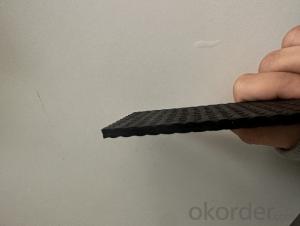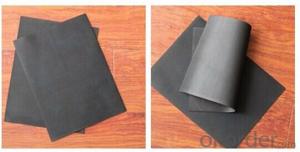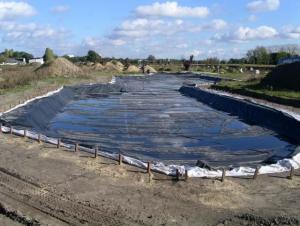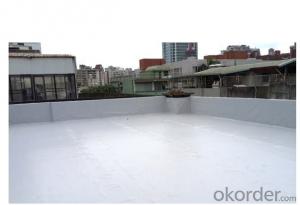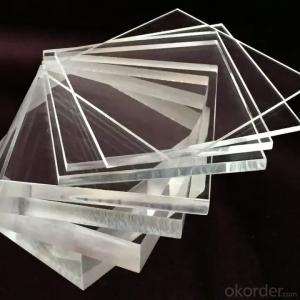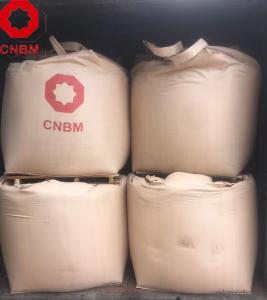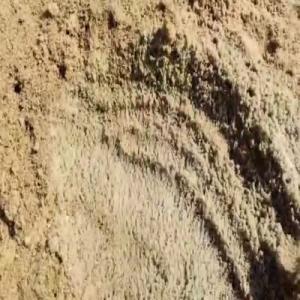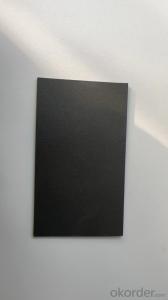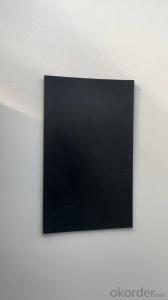Elastomer(SBS)Modified Bitumen Waterproofing Membrane
- Loading Port:
- China main port
- Payment Terms:
- TT OR LC
- Min Order Qty:
- 10 m²
- Supply Capability:
- 800000 m²/month
- Option:
- 1m*10m
OKorder Service Pledge
OKorder Financial Service
You Might Also Like
Item specifice
01 Product introduction Product Introduction
Jiuyang Elastomer (SBS) modified asphalt waterproof coil adopts thermoplastic elastomer (styrene-butadiene-styrene) modified asphalt as dipping coating material. With high quality polyester felt as the base, both sides coated with elastomer asphalt coating, with fine sand, mineral particles (sheets), PE film, aluminum film and other coating materials, the elastomer modified asphalt waterproof sheet is refined by advanced technology. The product has good waterproof performance and anti-aging performance. It has the characteristics of no flowing at high temperature, no brittle cracking at low temperature, simple construction and no pollution.
02 Product characteristics
1. Strong impermeability.
2. High tensile strength, large elongation, good dimensional stability and strong adaptability to base shrinkage deformation and cracking.
3. Good high and low temperature resistance, suitable for building waterproof in low temperature environment.
4. Puncture resistance, crack resistance, tear resistance, corrosion resistance, mildew resistance, weather resistance.
5. Convenient construction, hot melt construction four seasons can be operated, reliable joints.
03 Applicable scope
1. Widely used in roofing, basement, toilet, pool and other waterproof and moisture-proof of industrial and civil buildings, bridge, parking lot, swimming pool, tunnel, reservoir and other buildings, waterproof, moisture-proof, gas insulation, anti-seepage and asphalt roofing maintenance projects.
2. SBS modified asphalt waterproof coil is especially suitable for building waterproofing in cold areas and areas with frequent structural deformation.
04 Packaging and storage andtransportation
1. During transportation and storage, different types and specifications of products should be stored separately and should not be mixed. Avoid sun and rain, pay attention to ventilation.
2. Storage temperature should not be higher than 50℃, vertical storage can only be single layer.
3. Prevent tilt or transverse pressure during transportation, and cover felt cloth if necessary.
4. Under normal transport and storage conditions, the storage period is one year from the date of production.
- Q:Can a waterproofing membrane be used for stadiums or sports fields?
- Yes, a waterproofing membrane can be used for stadiums or sports fields. Waterproofing membranes are commonly used in construction projects to prevent water infiltration and protect the underlying structure from moisture damage. In the case of stadiums or sports fields, where there is constant exposure to the elements, including rain, snow, and irrigation, a waterproofing membrane can be an effective solution to prevent water damage to the foundation and other structural elements. Additionally, a waterproofing membrane can help to maintain the integrity and durability of the playing surface, preventing water from seeping into the field and causing issues such as unevenness, soft spots, or slippery conditions. Overall, the use of a waterproofing membrane can contribute to the longevity and performance of stadiums and sports fields by creating a barrier against moisture and its detrimental effects.
- Q:Are waterproofing membranes suitable for exterior use?
- Yes, waterproofing membranes are suitable for exterior use. These membranes are specifically designed to provide a barrier against water penetration and are commonly used in various exterior applications such as rooftops, balconies, and foundations. They are made from durable materials that can withstand exposure to harsh weather conditions, UV rays, and temperature fluctuations. Waterproofing membranes help to prevent water damage, moisture buildup, and potential structural issues caused by water infiltration. Additionally, they can be applied to different types of surfaces including concrete, metal, and wood, making them versatile for various outdoor environments. Overall, waterproofing membranes are a reliable solution for protecting exterior surfaces from water damage and prolonging their lifespan.
- Q:Can a waterproofing membrane be used on precast steel surfaces?
- Yes, a waterproofing membrane can be used on precast steel surfaces. The membrane is designed to provide a protective layer against water penetration, making it suitable for application on various surfaces, including precast steel. This can help prevent corrosion and prolong the lifespan of the steel structure.
- Q:Can a waterproofing membrane be used in food processing or pharmaceutical facilities?
- Food processing and pharmaceutical facilities can make use of a waterproofing membrane. These facilities often rely on waterproofing membranes to keep the surroundings dry and prevent water damage. By creating a barrier against moisture, these membranes ensure that leaks and water penetration are avoided. This becomes particularly crucial in environments where hygiene and cleanliness are of utmost importance, like food processing and pharmaceutical facilities. Furthermore, these waterproofing membranes can be applied to floors, walls, and ceilings, guaranteeing comprehensive protection. They are also commonly made from materials that resist chemicals and bacteria growth, making them even more suitable for use in sensitive environments. Ultimately, incorporating a waterproofing membrane in food processing or pharmaceutical facilities proves to be an effective method of maintaining a dry and safe environment for the production of high-quality products.
- Q:Can a waterproofing membrane be used on tunnels with vehicular traffic?
- Yes, a waterproofing membrane can be used on tunnels with vehicular traffic. Waterproofing membranes are designed to provide a barrier against water infiltration, protecting the structure from potential damage caused by moisture. In tunnels with vehicular traffic, water can seep through the concrete and cause corrosion, deterioration, and even compromise the structural integrity of the tunnel. By applying a waterproofing membrane, it creates a protective layer that prevents water from penetrating the tunnel walls, roof, and floor. This helps to extend the lifespan of the tunnel and ensures the safety of vehicles passing through. However, it is essential to select a waterproofing membrane specifically designed for heavy traffic conditions to withstand the constant load and wear. Additionally, proper installation and regular maintenance are crucial to ensure the effectiveness and longevity of the waterproofing system in tunnels with vehicular traffic.
- Q:Can a waterproofing membrane be used on steel surfaces?
- Indeed, steel surfaces can benefit from the application of a waterproofing membrane. These membranes are specifically designed to establish a shield against moisture and water incursion, and they possess the versatility to be utilized on a range of surfaces, including steel. Construction endeavors, including roofs, balconies, and foundations, frequently feature steel surfaces. By employing a waterproofing membrane on these steel surfaces, one can effectively thwart corrosion and harm arising from water contact. It is crucial to carefully choose a waterproofing membrane that suits steel surfaces, while also adhering to correct surface preparation and application techniques to attain maximum performance and longevity.
- Q:Can a waterproofing membrane be used for industrial facilities and factories?
- Yes, a waterproofing membrane can be used for industrial facilities and factories. Industrial facilities and factories often have areas that are exposed to moisture, such as basements, rooftops, and storage areas. These areas are prone to water leakage and damage, which can result in costly repairs and downtime. A waterproofing membrane is a highly effective solution for protecting these areas from water infiltration. It is a flexible and durable barrier that is applied to surfaces to prevent water from penetrating through. Waterproofing membranes are designed to withstand various environmental conditions, including temperature changes, UV exposure, and chemical exposure, making them suitable for industrial settings. By installing a waterproofing membrane, industrial facilities and factories can prevent water damage, mold growth, and structural deterioration caused by moisture. This helps to maintain a safe and functional environment for workers and equipment, while also ensuring the longevity of the facility. Additionally, a waterproofing membrane can help to improve energy efficiency by reducing heat loss through insulation and preventing water-related damage to HVAC systems. Overall, using a waterproofing membrane in industrial facilities and factories is a practical and cost-effective solution for ensuring the protection and longevity of the facility.
- Q:Can a waterproofing membrane be used in conjunction with solar panel installations?
- Yes, a waterproofing membrane can be used in conjunction with solar panel installations. Waterproofing membranes are commonly used to protect roofs and other surfaces from water damage, and they can provide an additional layer of protection for solar panels. This can help to prevent water infiltration and potential damage to the solar panels and their electrical components. Additionally, waterproofing membranes can also help to extend the lifespan of the solar panel system by providing an extra barrier against moisture and other environmental factors.
- Q:Can a waterproofing membrane be installed under tile or other flooring materials?
- Yes, a waterproofing membrane can be installed under tile or other flooring materials. Waterproofing membranes are commonly used in areas where moisture may be present, such as bathrooms, kitchens, and basements. These membranes act as a barrier, preventing water from seeping through the floor and causing damage to the underlying structure. They are typically applied directly onto the substrate before the tile or flooring material is installed. This ensures that any water or moisture that may penetrate the flooring is redirected and prevented from reaching the subfloor. By installing a waterproofing membrane, you can protect your floors and extend their lifespan while ensuring a dry and moisture-free environment.
- Q:Can waterproofing membranes be used on elevator shafts?
- Yes, waterproofing membranes can be used on elevator shafts to prevent water infiltration and protect the structure from moisture damage.
1. Manufacturer Overview |
|
|---|---|
| Location | |
| Year Established | |
| Annual Output Value | |
| Main Markets | |
| Company Certifications | |
2. Manufacturer Certificates |
|
|---|---|
| a) Certification Name | |
| Range | |
| Reference | |
| Validity Period | |
3. Manufacturer Capability |
|
|---|---|
| a)Trade Capacity | |
| Nearest Port | |
| Export Percentage | |
| No.of Employees in Trade Department | |
| Language Spoken: | |
| b)Factory Information | |
| Factory Size: | |
| No. of Production Lines | |
| Contract Manufacturing | |
| Product Price Range | |
Send your message to us
Elastomer(SBS)Modified Bitumen Waterproofing Membrane
- Loading Port:
- China main port
- Payment Terms:
- TT OR LC
- Min Order Qty:
- 10 m²
- Supply Capability:
- 800000 m²/month
- Option:
- 1m*10m
OKorder Service Pledge
OKorder Financial Service
Similar products
New products
Hot products
Hot Searches
Related keywords
